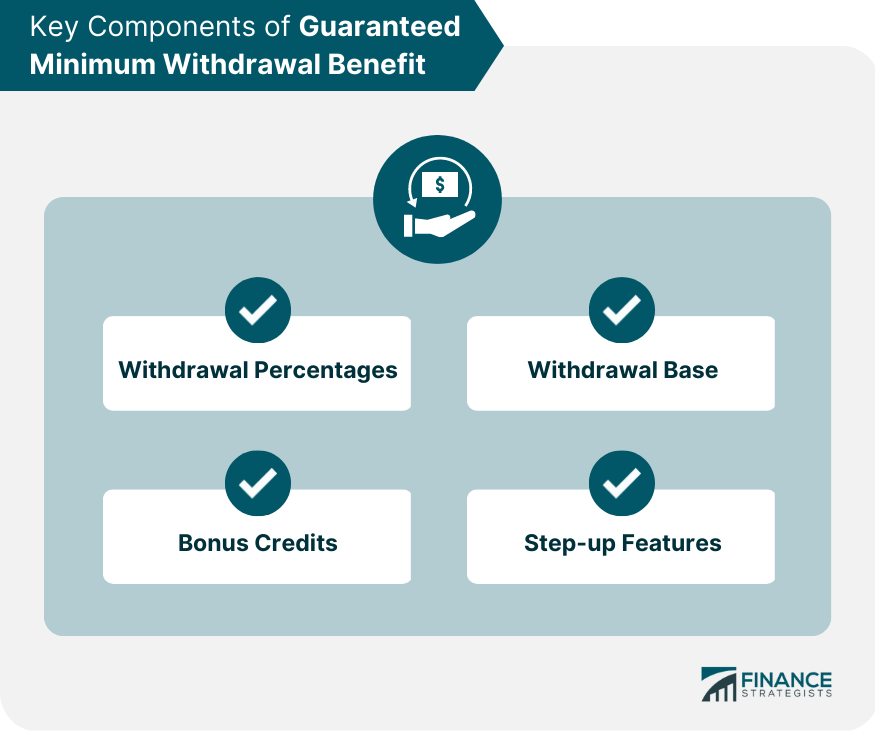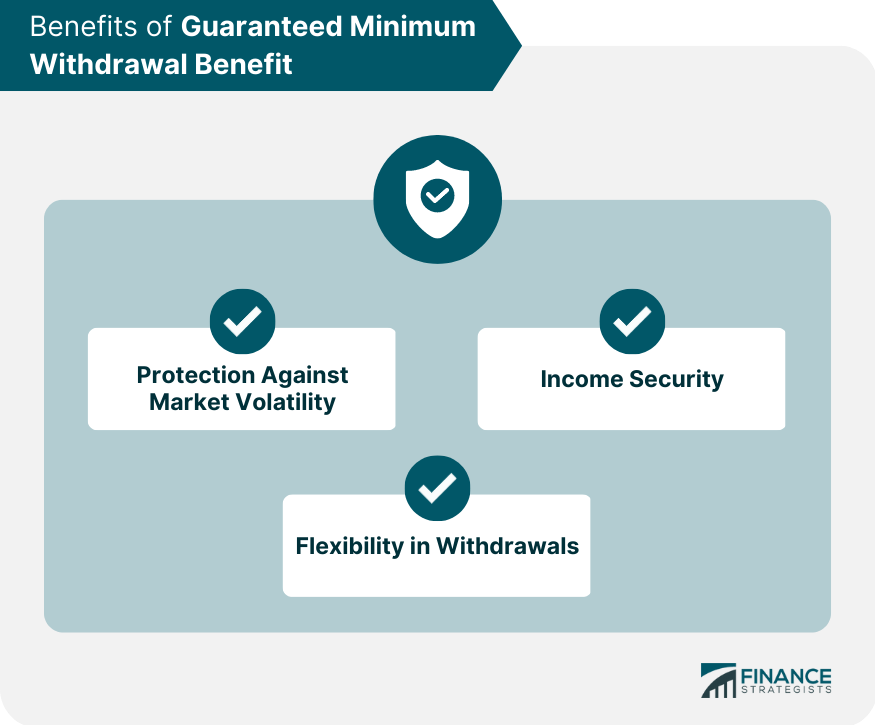The Guaranteed Minimum Withdrawal Benefit (GMWB) is a feature of certain annuity contracts. This feature guarantees the annuity owner a minimum income stream, regardless of market conditions, by allowing them to withdraw a fixed percentage of their investment each year without depleting the principal. GMWBs are designed to provide investors with a stable income stream during retirement. They help protect investors from outliving their assets by ensuring a consistent income flow, regardless of market fluctuations or poor investment performance. GMWBs are typically offered as a rider to variable annuities, but may also be available with fixed or indexed annuities. The specific features and costs of GMWBs can vary between different annuity providers and contract types. A detailed analysis of the main components of GMWBs, such as withdrawal percentages and withdrawal base. The withdrawal percentage in a GMWB determines the annual income stream available to the annuity owner. It is typically expressed as a percentage of the initial investment, and may vary depending on factors such as the owner's age and the specific terms of the annuity contract. The withdrawal base is the starting point for calculating the guaranteed income stream in a GMWB. It is typically equal to the initial investment, but may also include any bonus credits or step-up features that increase the value of the annuity over time. Some GMWBs include bonus credits, which are additional amounts added to the withdrawal base. These credits can increase the guaranteed income stream and provide a higher level of income security during retirement. Step-up features in GMWBs allow the withdrawal base to be periodically adjusted to reflect gains in the annuity's underlying investments. This can help ensure that the guaranteed income stream keeps pace with market growth and maintains its purchasing power over time. An examination of the key benefits associated with GMWBs, including income security and protection against market volatility. GMWBs provide a guaranteed income stream for retirees, ensuring that they have a consistent source of income regardless of market conditions. This income stream can help cover essential living expenses during retirement and reduce the risk of outliving one's assets. By guaranteeing a minimum income, GMWBs help shield investors from the negative effects of market volatility. This means that even in periods of poor investment performance, the annuity owner will continue to receive a steady income stream. GMWBs offer flexibility by allowing investors to withdraw a specified percentage of their investment each year without penalties. This feature enables investors to adapt their retirement income to their changing needs and circumstances. A discussion of the key factors to consider when selecting a GMWB annuity, such as risk tolerance and investment time horizon. Before choosing a GMWB annuity, investors should assess their risk tolerance to determine if this type of product is suitable for their financial needs and goals. Those with a lower risk tolerance may find the guaranteed income stream provided by GMWBs appealing. The investment time horizon is another important factor to consider when selecting a GMWB annuity. A longer investment horizon may allow for greater potential growth and a higher guaranteed income stream, while a shorter horizon may limit these benefits. Individual retirement income needs should be evaluated before choosing a GMWB annuity. This includes estimating future expenses and considering other sources of retirement income, such as Social Security and pensions. GMWB annuities often come with various fees and expenses, including management fees, insurance charges, and rider costs. It is crucial for investors to carefully review and understand these costs before purchasing a GMWB annuity to ensure it aligns with their financial objectives. Understanding the tax implications of a GMWB annuity is essential for proper retirement planning. Withdrawals from GMWB annuities are typically subject to income tax, and early withdrawals may incur additional penalties. Consulting with a tax professional can help clarify these implications. An overview of how GMWBs compare to other popular annuity options, such as Guaranteed Lifetime Withdrawal Benefit (GLWB) and Guaranteed Minimum Income Benefit (GMIB). Both GMWBs and GLWBs provide a guaranteed income stream, but GLWBs ensure that the income will last for the annuity owner's lifetime. The choice between a GMWB and a GLWB will depend on an individual's specific needs, risk tolerance, and retirement goals. GMIBs guarantee a minimum income level for a specified period or for the annuity owner's lifetime. Unlike GMWBs, which allow for flexible withdrawals, GMIBs typically require annuitization, converting the annuity into a fixed stream of payments. GMABs guarantee a minimum account value at the end of a specified period, protecting investors against market declines. While GMWBs focus on providing a guaranteed income stream, GMABs ensure a minimum return on the invested principal. An examination of various scenarios where GMWB annuities can be effectively used as part of retirement planning strategies. GMWBs can be used to supplement income from Social Security and pensions, providing additional financial security during retirement. This can help retirees maintain their desired standard of living and cover unexpected expenses. Longevity risk is the possibility of outliving one's assets during retirement. GMWBs can help mitigate this risk by providing a guaranteed income stream, ensuring that retirees will continue to receive income even if their other assets are depleted. Sequence of returns risk refers to the potential negative impact of market fluctuations on a retiree's portfolio. By guaranteeing a minimum income stream, GMWBs can help protect retirees from the consequences of poor investment performance in the early years of retirement. Guaranteed Minimum Withdrawal Benefits play a crucial role in retirement planning, offering financial security, flexibility, and protection against market volatility. By providing a stable income stream, GMWBs can help retirees navigate the uncertainties of retirement and maintain their desired standard of living. Each individual's retirement needs and goals are unique, and it is essential to carefully consider these factors when selecting a GMWB annuity. By evaluating risk tolerance, investment time horizon, retirement income needs, and other relevant factors, investors can choose a GMWB product that best aligns with their financial objectives and ensures a comfortable retirement. To find the most suitable GMWB annuity for your individual needs and goals, it is highly recommended to work with a knowledgeable insurance broker. They can help navigate the complex world of annuities, ensuring that you make well-informed decisions.Definition of Guaranteed Minimum Withdrawal Benefit (GMWB)
Key Components of GMWB
Withdrawal Percentages
Withdrawal Base
Bonus Credits
Step-up Features

Benefits of Guaranteed Minimum Withdrawal Benefit
Income Security
Protection Against Market Volatility
Flexibility in Withdrawals

Factors to Consider Before Choosing a GMWB
Risk Tolerance
Investment Time Horizon
Retirement Income Needs
Fees and Expenses
Tax Implications
Comparison of GMWB with Other Annuity Options
Guaranteed Lifetime Withdrawal Benefit (GLWB)
Guaranteed Minimum Income Benefit (GMIB)
Guaranteed Minimum Accumulation Benefit (GMAB)
Applications of GMWB in Retirement Planning
Supplementing Social Security and Pension Income
Protecting Against Longevity Risk
Managing Sequence of Returns Risk
Bottom Line
Guaranteed Minimum Withdrawal Benefit (GMWB) FAQs
GMWB is an annuity product that offers a guaranteed income stream to the annuitant, regardless of market conditions.
GMWBs allow for flexible withdrawals, while GMIBs typically require annuitization, converting the annuity into a fixed stream of payments.
Retirees who are looking for a guaranteed income stream and protection against market volatility may benefit from a GMWB.
Factors to consider include an individual's risk tolerance, investment time horizon, retirement income needs, fees and expenses, and tax implications.
Yes, there is typically a maximum percentage of the initial investment that can be withdrawn each year with a GMWB, as outlined in the annuity contract.
True Tamplin is a published author, public speaker, CEO of UpDigital, and founder of Finance Strategists.
True is a Certified Educator in Personal Finance (CEPF®), author of The Handy Financial Ratios Guide, a member of the Society for Advancing Business Editing and Writing, contributes to his financial education site, Finance Strategists, and has spoken to various financial communities such as the CFA Institute, as well as university students like his Alma mater, Biola University, where he received a bachelor of science in business and data analytics.
To learn more about True, visit his personal website or view his author profiles on Amazon, Nasdaq and Forbes.











